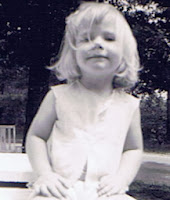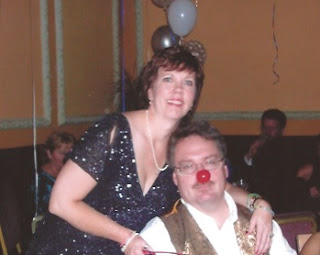He stood just outside the church
door as the congregation left the Christmas Eve services, a bean pole in a
clean white shirt and bow tie, overalls, and brushed brogans, waiting for the
Angel of the Lord. In his long, bony hands, he held a lumpy brown paper sack. He
seemed old enough, surely, to have known God’s favorite uncle in the first grade.
The Angel of the Lord had finished
her work and was ready to go home and wait for Santa Claus. It had been a big
night, and she had done all that was asked of her.
She had not panicked upon first
realizing that most all of the lights in the church would be turned off for the
nativity play, and she had stayed calm
throughout the performance in the near-dark. She had remembered to step, pause,
step, as she’d been shown, and had arrived at almost the right time to meet the
shepherds in front of the pulpit.
While she waited in the dim candlelight
for them to emerge from behind the choir, she swished the skirt of her white
gown back and forth and admired her hands, wishing she had a ring with a
sparkly stone in it. But she didn’t wander off to talk to her friends in the
front pew, or wave at the preacher.
She remembered everything she was
supposed to say and did not lapse into one word of Peter, Peter, Pumpkin Eater,
though she was sorely tested in a long pause after “Behold I bring you good
tidings of great joy . . .” before someone finally gave her a prompt. She
remembered not to shift and scratch at her itchy panty lace, no matter how much it
ate into the soft skin of her bottom.
After the Baby Jesus had been born
and the Wise Men had ponied up their gifts and the choir had sung, and there
had been a general approving outbreak across the pews of, “Amen, Amen, AAAAA-men,” (after all, it was just not considered seemly to clap hands in
the house of the Lord Jesus Christ), the preacher’s wife fumbled the lights
back on.
As the Angel of the Lord blinked in the sudden brightness, it seemed to her like
everyone in the church was smiling at her angelic nature. Or at least her blue
eyes and blonde hair and snub little nose.
Leaving the church, the Angel
spotted the old man waiting for her and hugged his legs. He patted her hair
without a word and gave her the lumpy brown sack.
The two were each other’s
favorites. Most Sundays, he’d wait outside by his truck so she could watch him
roll his after-service cigarette. She loved to watch him blow floating little
o’s that grew bigger the higher they went, and he loved to watch her eyes watch
the smoke. His hands were as hard as cow horn and he was still strong enough
hold her up above his head in just one of them.
The Angel knew there would surely
be something wonderful in the bag, because everything he did was wonderful. So
she took it and thanked him. She gave him a glancing kiss when he bent down for
it, and sang Merry Christmas at him and followed her mother to the warm, idling
car where her father waited.
Unrolling the open end of the sack,
she peered inside and stopped dead in her tracks in the middle of the warming lines of cars.
Her mouth dropped open and her tiny voice pealed through the night air on the
piney hill-top.
“Well, there ain’t nothing in this whole bag
but oranges and pecans with the shells still on. There ain’t one piece of
chocolate candy in it. It ain’t nothing Christmasy at all. Just everyday
stuff.”
The look of puzzled indignant shock
appeared simultaneously on the faces of mother and child. The girl’s slid off
as the mother shushed her violently and lifted her into the waiting car like a
bag of rotten potatoes. The mother's stayed on her face. The usually calm woman slammed the door behind them as
the Impala nosed down the gravel drive.
“Did you hear what your daughter
just said?” The mother asked.
“I do believe we all did,” answered
the man behind the wheel.
“Thank God Hiram Bynum is as deaf
as a post,” the mother said.“ Do you remember how happy we were when she
started to talk so early?”
The paper sack crinkled in the
girl’s hands.
“Stop rustling that sack,” she said
to the girl. “And not another word out of you until we get home, Miss
Rooty-Toot-Toot.” The trip was long and silent.
Now across the kitchen table that
night, the little girl regards her mother sleepily. The brown paper sack rests
on the table between them. They are Having a Talk, which the girl knows means
that the mother will talk and she will listen. The girl also knows she must
remember not to let her mind wander, or hum, or swing her legs; not to ask for
anything, or try to talk about things that have Nothing To Do With The Subject
At Hand. Like chickens.
The girl is tired. She has been
listening a long time now. Her back itches from the angel wings. She has a
headache from wearing the halo all night. One of her socks has lost its grip
completely and has collapsed around her left ankle. She has a tangle of
over-hair where she has scratched at the bobby pins that support the halo that
has given her the headache. She would much rather be watching McHale’s Navy and
drinking a Coca-cola.
In the middle of a long chain of
talk, some words jump out at her.
“Mr.
Bynum used to be a little boy a long time ago. Just like you are a little girl
now.”
This catches her imagination. The girl
begins to listen in earnest.
“I can see that your daddy and I
have not given you nearly enough opportunities to feel hungry, child. The
things you call regular aren’t. Or they weren’t always. Times were hard when I
was a little girl, myself, and especially when Mr. Bynum was a boy.”
“There was no fresh fruit in
winter, or nuts either, if you didn’t gather them and store them in the fall
time. And oranges. Well. Oranges were something that came on the train at
Christmas from way down in Florida. And expensive? Law! One year my daddy took
the wagon all the way to the depot in town in a bad storm to meet the train
when it came in, just so we could taste one.”
“And that’s what I got that year.
Two whole oranges, a piece of stick candy and some green wool cloth for my
mother to make me a winter coat.”
“We all shared the one orange at
home between us. I took the other one to school. At recess, I peeled it and
passed it around in sections. When those were gone, I tore up the peel and
passed that around. That was all I got of that second orange. A piece of the peel.
Those were the best oranges I ever ate.”
“All you got was a piece of the
peel?” The girl asks.
“Yes, and it was wonderful.” The
mother turns her head slightly and looks at the girl hard. “Sometimes in life,
you get the orange and sometimes you get the peel. The trick is to learn to
enjoy everwhich one you’ve got at the time. But that’s a lesson for another
day. Sit up and pay attention.”
The girl adjusts her spine in what
she hopes is a listening attitude.
“Now the things in that sack might
not seem like much to a little girl who gets rocking horses and doll babies, and
all such kinds of play-pretties, but they were the kind of things that made Mr.
Bynum happy. The kind of things he liked to get for Christmas when he was a
boy. Or maybe even they were the kind of things he wanted to get and didn’t.
Either way, he has given you something special, and not a bit everyday. Ain’t
nothing about a gift that’s everyday. Especially when somebody’s trying to give
you their Christmas feeling.”
“And when somebody gives you a gift
of everwhat kind, what you do is feel
thankful for it. And I don’t mean just to be thankful to the person that gave
it to you to their face. That goes without saying, whether you like what they
gave or not. I mean for you to be thankful inside your own self, down in your heart. Thankful that the world has
people in it who will go to the trouble of giving things to other people. And
that one of the people that is loved enough to get given to is you.”
“You need to learn a new word
tonight, child. The word is, grateful. Do you understand what I’m telling you?”
The little girl blinks a long
blink. She scratches at the bobby pins in her hair with one hand. The halo slides
to rest over her right ear. She blinks another long blink.
“Because if you are going to amount
to a hill of beans in this world, child,” the mother continues, “you’ll need to start understanding
this before you get too much older.”
The girl shifts on her seat and
scratches at her panty lace with the other hand. She fluffs out her white
cotton angel gown and pulls up her left sock.
“I think I do,” she says. “I think
what you mean is that Mr. Bynum didn’t give me just any old oranges and pecans.
He gave me his oranges and pecans. That he loved. And because I love him and he loves me, they are special. More
special than Almond Joys even.”
“That’s close enough for now,” her
mother says. “Come here.”
The little girl scrambles down from
the kitchen chair and moves into the waiting circle of her mother’s arms.
“I will need to tell Mr. Bynum
thank you next Sunday, for my paper sack.”
“Yes, you will.”
“Do you think that Santa Claus will
still come even though I have acted ugly?”
“Yes. I think he will still come.
Especially if you go to bed right quick.”
“Will I have time to watch McHale’s
Navy first?”
“No, I don’t think so.”
“Can I have a co-cola to drink?”
“No.”
“Do I have to brush my teeth and
wash my face?”
“Yes.”
“You don’t have to check behind my ears. I’m
very clean back there.”
“I’ll look anyway, just be on the
safe side.”
“Will you read me three stories?”
“I’ll read you one.”
“How about two?”
“How about one?”
“How about one book-story, and one story
about you and the orange peel and your green coat your mama made you when you
were little?”
“OK.”
“Can I bring my paper sack to bed
with me?”
“Yes.”
The girl steps back and regards her mother
evenly. Her face takes on a speculative look.
“Do you think that there is the least little
chance in the world that Santa Claus will bring me a monkey this year?”
“No, child. I don’t think there is
the least, littlest, tee-niniest chance in all the whole wide world that Santa
Claus will bring you a monkey this year. Or next year, either.”
The girl pulls the halo away from
her head and lets it drop on the floor. She reaches behind her with both hands
and lets loose a frenzy of uninhibited bottom-scratching.
“Oh, well,” she says. “There ain’t
no bananas in my sack anyway. Maybe he’ll bring me a pony instead.”
 |
| Eventually gets a pony |
Happy New Year. Here's hoping you recognize the gifts this year brings you for what they really are.
Thanks for coming. Come again soon.
Leann

















